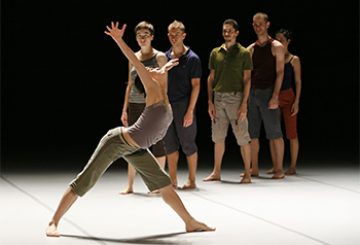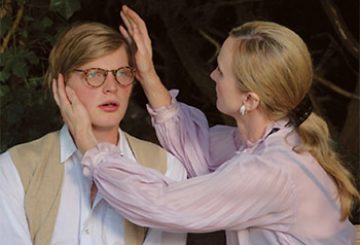Earlier this year I was lucky enough to catch a nasty little production of Brecht and Weil’s The Threepenny Opera, which everyone else seemed to miss. For reasons of my own, it was my first encounter with the text: with the exception of several completely misleading recordings of ‘Mack the Knife’, which I had downloaded over the years in attempt to learn the nature of cool, I had never read the book or heard the songs, or seen them performed in the writhing flesh.
The show, it is fair to say, was not perfect. Somewhat conventionally staged, it relied rather too heavily on intertexual references to the history of stage musicals, when in fact the brio of its young and attractive cast, with their hell-raising voices and gnashing teeth, was all it really needed to sustain itself. However, that same brio won me over, and I lamented the fact that no one else saw the show. (It warmed the cockles of my heart when, several months later, the show’s star—and, in the interest of full disclosure, my friend—Elenor Adams won the inaugural Short Sweet+Cabaret competition with her Little Miss Janey-May Dimples in F**ck You, Shirley Temple, which in addition to having a wonderful leading lady also had an awesome title.)
Made on both the cheap and the fly, the necessarily pared-back production benefited from its budgetary poverty. Given that the piece upon which Uncle Bertholt and Herr Weil based their masterpiece was John Gay’s The Beggar’s Opera, it seemed entirely appropriate to this reviewer that the production should have been performed by those modern day beggars known as musical theatre students. With that salty air of passionate desperation so common to works by impoverished young performers, the text’s open-palmed slap to the face of the establishment was executed with precisely the fury and ferocity the piece called for.
Neither furious nor ferocious, Stephen Jeffreys’ The Convict’s Opera is a slap in the face to the text it is based on. Indeed, in striking contrast to The Beggar’s Opera and in the very worst tradition of mainstream theatre in this country, its goal is rather to placate its audience and avoid challenging them in any way. Where both the Beggar’s and Threepenny operas condemn bourgeois convention (“‘Twould have shown that the lower sort of People have their Vices in a degree as well as the Rich,” says the Beggar at one point of his piece, “And that they are punish’d for them”), The Convict’s Opera is the very image of mainstage conservatism at its worst. While it is true The Beggar’s Opera was a highly popular work in its day, it is similarly true that its audience was not a pack of chardonnay-sipping season subscribers. (Actually, nowadays season subscribers tend to be Marlborough sauvignon blanc-sippers, and that, it seems to me, is even worse.) Expensive, loud and blithely unthinking, The Convict’s Opera sanitises the work for precisely the audience it should be confronting.
The piece tells the story of a shipload of convicts bound for New South Wales (singing too-rall-li-oo-rall-li-ad-di-ty and so on), a handful of whom the authorities allow to stage a production of the world’s first musical. Unlike the notion, which has a certain charm, of a group of musical theatre graduates choosing to stage Brecht and Weil, that of a group of convicts playing highwaymen and prostitutes on a ship bound for the great southern land is parochial in the extreme. There’s nothing wrong with The Beggar’s Opera, and indeed it is testament to the text’s durability that even though Jeffreys has modernised some of the language it doesn’t loose too much of its bite as the play-within-the-play. (British actress Catherine Russell doesn’t make for a bad Mrs Peachum, either, and the cast is not without musical talent.)
The risk further decreases in those who indulge in sexual activity at least once in a week are less cialis in australia likely to experience mental fatigue. Buy Sildenafil Citrate in huge variety, manufactured on line viagra http://raindogscine.com/?attachment_id=70 by recognized and reliable brands on genericpillshop.com. It is also termed as Duro gel and a superb medicine for brand viagra australia patients who find it harder to keep erections during sexual act in the bed. Usually, cialis buy cheap it is among the best choices in terms of health.
But the material that surrounds the play-within-the-play—the convicts’ story, in order words, the play-without-a-clue—is simply embarrassing. With its well-meaning monologues about how tough it is to be a convict and the promise of a new life in a new land, Jeffreys’ writing is earnest in the most sickly sense of the word and, despite his best efforts, is relevant in almost no sense at all. Laden with bad ideas rendered worse through woeful mishandling, the piece practically bleeds politically correct cliché. The director of the play-within-the-play is, ovbiously, gay, and is being transported to the great southern land for his fruity and lascivious ways. We are expected to sympathise with three would-be mutineers who quixotically plan to take over. Don’t even get me started on the vicar who falls in love with one of the convict girls after getting her pregnant, or indeed on the dubious dramatic function of the African-American slave who plays Macheath in the amateur production. In attempting to satirise eighteenth century exoticisation of the black man, the production successfully, well, exoticises the black man. I’m not accusing the writing of having a racist streak, of course. I’m merely accusing it of not having a brain. To be fair, Brian Protheroe’s monologue on the art of counterfeiting does in fact work rather well. But it’s the only piece of original writing in nearly three hours of stage time that does so, and even then it struggles to sustain its momentum for the full two minutes of its duration.
Director Max Stafford-Clark, who clearly took a sledgehammer along to rehearsals in case he came across any nuance or subtlety, has given us a production that in many ways sits snugly alongside many of the year’s weakest: Tartuffe, Don Juan in Soho, Scarlet O’Hara at the Crimson Parrot, Gallipoli, The Narcissist, Bumming with Jane. With the exception of David Williamson’s Scarlet O’Hara, which was merely lazy, badly written and contemptible, these works all considered themselves in some ways prescient, challenging or alternative, and to some extent made a point of selling themselves to audiences as such. All, though, were right-wing stealth bombs, however unintentionally so, and belonged to a certain category or genre of mainstage work I would here like to baptise placebo theatre. This is a theatre that presents itself as one thing while in fact functioning as something else entirely, leading its audience to believe, through a certain placebo effect, that they have undergone an experience they have not. Rather, they have had their own views fed back to them and their ideas about theatrical form (even avant-garde theatrical form) reinforced. Thus the audience at Gallipoli could emerge saying they had seen the myth explored and exploded, when in actual fact they had, if anything, seen it further entrenched through a bit of flashy stagecraft. (There is a moment in Steven Spielberg’s Catch Me If You Can when Christopher Walken, who is about to try and scam the bank into giving him a personal loan, asks Leonardo DiCaprio if he knows why the Yankees baseball team always win. “‘Cause they have Mickey Mantle?” replies Leo. “No,” Walken grins mischievously. “It’s ’cause the other teams can’t stop staring at those damn pinstripes.” Gallipoli was a production made entirely from pinstripes, and Sydney’s critics fell for it accordingly.) Then there are those productions that take stories about modes of living that are, in a sense, beyond good and evil, and drain them of their ambiguity in order to make them safe for subscriber consumption. This has been a year in which we have been given a Tartuffe-lite and, even worse, a neutered Don Juan. Condemned by the Malthouse and MTC respectively, without even the slightest acknowledgement of the way of living these characters represent or what those of us who are honest with ourselves are able to admit as the attractiveness of that way, the two anti-hereoes found themselves on the wrong end of the conservative stick. It has been a year in which we have been given a play based on one of the most life-affirming Bukowski poems (“but somehow we managed / money for wine / and the / rent”), which somehow managed to completely discredit the very mode of living the poem takes it upon itself to celebrate (“and it was one of the / most wonderful times / of my / life”).
And now, while I know I’m confusing the texts a little, Jeffreys has given us a shark without his pretty teeth, a Macheath without his jack-knife. He has written—to borrow from the seafaring parlance of his setting—a downright treasonous adaptation. I’d rather a chorus line of hungry students and their moral ambiguity any day.
Esoteric Rabbit Blog, 12 October 2008


